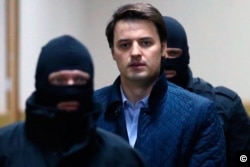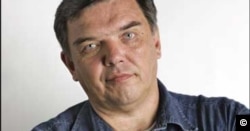Maksim Borodin, a 32-year-old investigative reporter, died in the Russian industrial city of Ekaterinburg on April 15. He had been reporting about the deaths of Russian mercenaries from his region in Syria. The Kremlin has systematically denied that Russian mercenaries have fought in Syria.
Borodin’s reports from the funerals of Russians killed fighting in Syria while employed by the shadow military group Wagner, and interviews with their relatives, contradicted the official narrative.
Polygraph.info published audio recordings of Wagner servicemen admitting massive losses at the hands of U.S. troops whom the Russian mercenaries had knowingly attacked. We also revealed ties between Wagner and the Kremlin.
Borodin’s news agency, Novy Den (New Day), announced that he died on April 15 after sustaining lethal injuries from falling from the balcony or window of his fifth-story apartment on April 12.
There were no witness interviews to confirm or deny the official version that he had “fallen from the balcony/window.” The only press reports on the incident said the journalist was found by neighbors lying unconscious on the street near his apartment building.
Novy Den chief editor Polina Rumyantseva initially said that the circumstances of the incident were “unclear” but that “a crime” could not be ruled out.
She later appeared to backtrack, saying that Borodin “apparently fell from the balcony while smoking” and ruling out the possibility of suicide. “We spoke a week before the incident,” she said. “He was supposed to be moving to Moscow and working for our agency there, he had built grandiose plans.”
Rumyantseva “categorically rejected the allegations that Borodin’s death was connected to his reporting,” and other colleagues and friends downplayed the significance of his reporting about Wagner.
Not everybody supports the official narrative.
Local activist Vyacheslav Bashkov said in a Facebook post that Borodin called him on April 11, the day before he was found, saying he urgently needed to find a lawyer because masked, armed men were on his balcony and in the stairwell and preparing to raid his apartment. Bashkov said that Borodin called again later that day and said he that he had made a mistake, and what he had seen was probably a security exercise.
“Russian authorities must conduct a thorough investigation into the death of journalist Maksim Borodin and consider the possibility that he was killed in retribution for his reporting,” the Committee to Protect Journalists said on April 16.
The Organization for Security and Cooperation in Europe Representative on Freedom of the Media, Harlem Désir, called on the authorities “to carry out a full, transparent and independent investigation into the circumstances of the death of Maksim Borodin.”
Falling out a window is not an uncommon cause of death for public figures in Russia. Some of the most suspicious cases include:
Alexey Stroganov, a prominent member of Solidarity, a Russian opposition party, died in October 2017 after falling out of a window at the second floor of his apartment building. His death was ruled accidental and no criminal investigation was launched.
Vadim Godlevsky, a magazine publisher, died in December 2017 after falling from a window on the 14th floor of his luxury apartment building in Moscow. Investigators concluded that his death was a suicide.
A Russian Interior Ministry general, Boris Kolesnikov, died in June 2014 after falling off of a balcony on the sixth floor of the State Investigative Committee building in Moscow. Kolesnikov had been arrested in February of that year on corruption charges, and was brought to the State Investigative Committee building from a detention cell for questioning in the case against him. His death was ruled a suicide.
An unnamed criminal suspect of Central Asian origin died in March 2016 after falling from a window on the fifth floor of the Center for Countering Extremism in Moscow during questioning. His death was ruled a suicide.
Igor Vakhnenko, a businessman, died in September 2008 after falling from a window on the fifth floor of the building of the local branch of the Interior Ministry’s Department for Combating Economic Crimes (UBEP) in the city of Tomsk. An investigation found Vakhnenko had been thrown out of the window by the local UBEP head and his deputy, and ruled the death a murder.
Ivan Safronov, an investigative reporter with Kommersant newspaper, died in March 2007 after falling from a window in the third floor staircase of his apartment building. Investigators ruled his death a suicide.
“Throwing themselves of the windows of investigative offices and dying is a more common thing in Russia than you can imagine,” Russian investigative journalist Orkhan Jemal said, with a note of sarcasm. “We have had cases in which suspects managed to jump out of completely sealed, barred windows, and even cases in which the suspects suffered multiple lethal injuries from falling out of first floor windows.”
Jemal asserts that “window deaths” are one of the common “methods” police and secret services in Russia use to cover up deaths from torture, or to get rid of unwanted witnesses.









